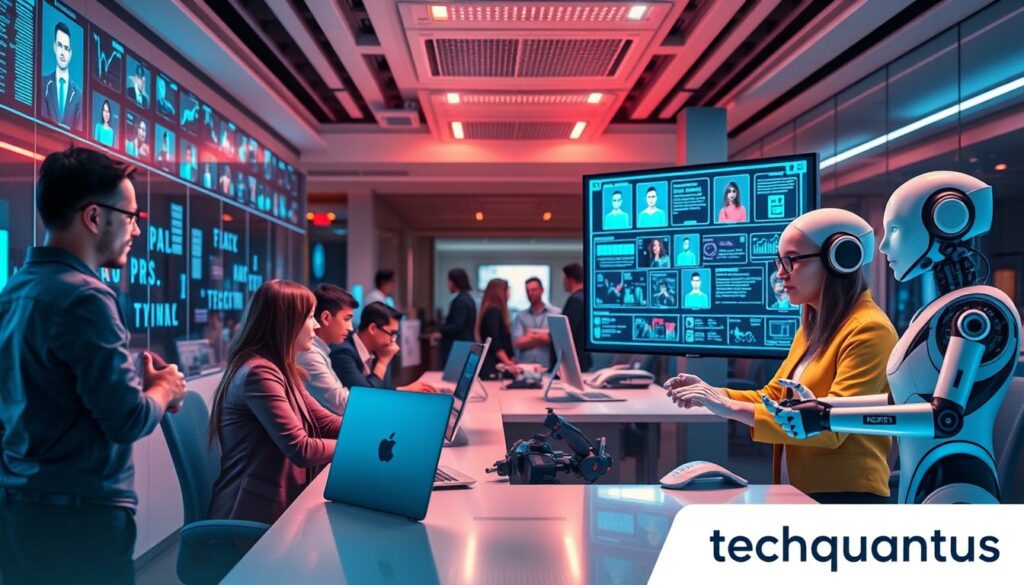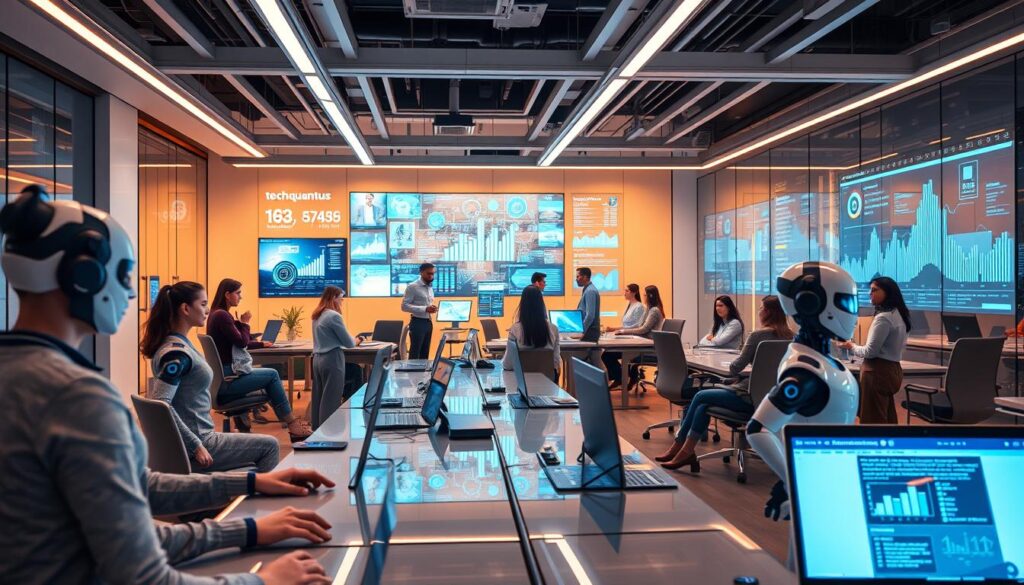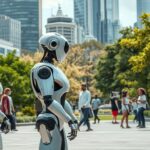Did you know that by 2025, 70% of all new business applications will use low-code or no-code tech? This shows a big change in how companies handle recruitment and employee management. AI in HR is now key, changing old hiring ways and making talent management more efficient.
In today’s fast business world, companies see the value of using AI in recruitment. It cuts down the time and cost of hiring. Plus, AI helps make better decisions and makes the hiring process better for candidates, which is key in our digital age.
Technology is moving forward, making employee management and HR automation better. With data analytics and smart screening, these changes can boost talent management and help your company succeed. Learn more about how no-code platforms help teams innovate fast by reading this article on empowering business teams with no-code app.
Key Takeaways
- AI makes recruitment faster, more efficient, and cheaper.
- Companies using AI in HR see better decision-making and a better candidate experience.
- By 2024, algorithmic managers will be key in hiring and training.
- Good employee management uses advanced analytics and AI tools.
- Adding AI to current systems can greatly improve operations.
The Role of AI in Recruitment Automation
AI changes recruitment automation by making processes better and reducing biases. It speeds up finding the right candidates. With benefits of AI recruitment, companies can hire faster and make better choices. They improve candidate experiences with personalized messages and quick outreach.
Benefits of Using AI for Recruitment
Using AI hiring technology brings many advantages:
- Faster decision-making through automated resume screening.
- Improved candidate matching, reducing the gaps between applicants and positions.
- Personalized outreach based on data-driven insights, fostering better connections with candidates.
- Prediction of job performance and fit via analysis of historical data.
Streamlining the Hiring Process with AI Technology
Adding AI to the hiring process makes things run smoother. It automates tasks like scheduling interviews and initial checks. This saves time and lets HR teams plan better. There are many AI tools out there that make things more efficient and engage candidates better:
| AI Tool | Functionality | Impact on Hiring |
|---|---|---|
| Resume Screening Algorithms | Analyzes and ranks candidates | Reduces time-to-hire significantly |
| Chatbots | Assists candidates with queries | Enhances candidate experience |
| Predictive Analytics Software | Forecasts candidate success | Improves quality of hires |
These advances in recruitment automation show how technology is key to meeting market needs. They help HR teams be more proactive in tackling hiring challenges. For more on how low-code platforms help businesses, check out this article empowering businesses. Using AI in recruitment fits with industry trends and helps organizations grow by making hiring better.
Understanding AI in HR: Key Technologies and Tools
The world of HR is changing fast with AI. AI HR technology helps with recruitment and managing employees. It brings new tools and solutions to the table. Knowing about these technologies is key to using AI in HR well.
Essential AI Recruitment Tools Available Today
Many companies are using the best AI recruitment tools to make hiring easier. Tools like HireVue and Pymetrics lead the way with predictive assessments. These tools help screen candidates better and cut down on manual work for HR teams.
AI-Powered Screening Solutions and Algorithms
AI screening solutions are now a must-have for HR. These algorithms match job descriptions with candidates’ resumes. This means finding the right person for the job with less chance of mistake. Machine learning in these tools creates a better ranking system. It looks at candidates’ skills to make hiring more efficient.
Using HR automation tools is not just for recruitment. Companies see the value in AI for many HR tasks. For more on AI’s impact, check out a recent summit on responsible AI in the military here.
| Tool | Functionality | Benefits |
|---|---|---|
| HireVue | Video interviews with AI analysis | Increases efficiency in screening |
| Pymetrics | Predictive assessments for candidate matching | Enhances candidate engagement and fit |
| LinkedIn Recruiter | AI-driven candidate sourcing | Expands reach to diverse talent pools |
By using these AI HR technologies, your company will make better decisions. This leads to a more engaged and productive team.
Enhancing Candidate Experience through AI
In today’s job market, making the candidate experience great is key to finding the right people. AI helps make the process better by offering a more engaging and personal experience. With AI chatbots, companies can quickly help candidates and give them what they need, making the whole process more enjoyable.
Personalized Communication with Chatbots
AI chatbots change how we talk to candidates. They answer questions right away, cutting down on the wait times we used to have. These smart systems understand what candidates are asking thanks to natural language processing. This means candidates get the info they need fast and feel important and well-informed as they apply.
Optimizing Job Matching for Candidates
Finding the right job for a candidate is now key. AI looks at things like experience, skills, and what a candidate wants to find the best fit. This makes the hiring process better for everyone, as people are more likely to find jobs that match their abilities. It also helps keep employees happy and with the company for a longer time.
| Feature | Traditional Recruitment | AI-Powered Recruitment |
|---|---|---|
| Response Time | Long delays | Immediate responses |
| Candidate Engagement | Low interaction | High engagement via chatbots |
| Job Recommendation Accuracy | Subjective matching | Data-driven personalization |
| Overall Satisfaction | Variable experiences | Enhanced candidate experience |
Integrating AI with Current HR Systems
Adding AI to your HR systems brings big benefits, like better HR system integration and making things work smoother. Companies use many HR tools, like Applicant Tracking Systems (ATS) and Human Resource Information Systems (HRIS). When you make AI and HR software compatible, you can use your current data better and work more efficiently.
Compatibility with Existing HR Software
For AI to work well, it must work with your current software. This makes sure data moves smoothly, which boosts productivity. By making sure AI and HR software work together, companies can get the most out of their tech. For example, top AI tools can make checking resumes easier with ATS, letting recruiters spend more time on big decisions.
Data Security Considerations When Implementing AI
When adding AI to HR, keeping data safe is key. Since HR deals with personal info, it must be protected well. Good data security in AI means using strong encryption and following rules like GDPR. This way, you build trust with your team and keep your data safe from hackers.
Looking ahead, make sure your AI fits with your HR systems and keeps data safe. This will help you stay in line with laws and create a secure workplace. Using AI can really change how HR works, as seen in this innovation landscape.
Using AI for Employee Management
Managing employees well is key to a company’s success. AI helps by giving deep insights into how employees work and engage. This lets bosses make smart choices to improve their teams.
Performance Tracking and Analytics
AI in performance analytics helps spot top performers. It looks at data from various tools to see who’s doing well. For instance, it can track Gen Z’s strengths in talking to others and thinking ahead.
This approach is fairer, cutting down on bias. It makes the workplace better for everyone.
AI for Employee Engagement and Retention
AI tools boost employee engagement by meeting their needs. They gather feedback to shape strategies to keep employees happy. Studies show that offering growth chances keeps Gen Z motivated and loyal.
Creating a supportive work environment is key. It means offering flexibility, open talks, and chances for growth. This keeps employees happy and on board.
The HR Outsourcing market is growing fast, expected to hit $40 billion by 2025. Big names like ADP and IBM are leading the way in using AI for managing employees. For more tips on getting the best out of your team, check out this article: Gen Z in the Workplace.
AI in HR: Future Trends and Developments
Looking ahead, AI in HR will bring big changes. New trends and innovations will shape the future. AI tech will make HR processes more efficient and give us more personalized experiences.
Predictions for the Next Decade
AI will focus more on personalization and predictive analytics in the next decade. Companies will use AI to make smarter decisions by analyzing their teams. By 2025, over 70% of new apps will let HR pros make tools for their needs.
This will make decisions faster and boost team productivity.
The Role of AI in Remote Work Environments
AI is key in remote work. It helps manage virtual teams and keeps employees engaged. AI tools will track performance and help teams communicate better, making work more productive and morale higher.
Using HR tech trends in digital workflows will help remote teams work well together. This keeps them connected and productive.

Overcoming Challenges in Implementing AI Solutions
AI solutions bring big opportunities but also big challenges. Companies face issues like bias in AI recruitment and training employees for AI tools. It’s key to understand these challenges for success.
Addressing Bias in AI Algorithms
Bias in AI recruitment is a big problem. AI can reflect biases in old data, leading to unfair hiring. To fix this, companies must check and change algorithms with ethics in mind.
Feedback mechanisms can spot bias, helping teams make their systems fairer. This makes hiring more inclusive.
Training Employees to Work with AI Tools
Training employees for AI is crucial. Offering workshops and resources helps build confidence in using AI. This training improves understanding of AI and how it fits into work.
With the right skills, employees can work well with AI. This leads to a culture that values innovation and change.
Success with AI depends on tackling these challenges. Companies that work on bias and train employees well will do better in recruitment and management.
| Challenge | Solution |
|---|---|
| Bias in AI Algorithms | Implement continuous monitoring and adjust algorithms |
| Lack of Proper Training | Provide comprehensive training workshops for employees |
| Resistance to Technology Adoption | Encourage a culture of innovation and support |
| Insufficient AI Knowledge | Develop accessible resources and learning platforms |
Case Studies: Successful AI Implementation in Recruitment
Leading organizations use AI in recruitment to boost efficiency and effectiveness. These examples show how companies have successfully used AI. They offer lessons for your HR practices.
Examples from Leading Companies
Unilever uses AI to screen candidates, improving diversity and cutting down hiring time. This shows how AI can change hiring for the better. Other companies use AI to make recruitment faster and more focused, attracting diverse candidates and promoting inclusivity.
Lessons Learned from AI Integration
AI case studies teach us about the power of clear communication. It helps employees understand and use AI tools better. Also, regularly checking how AI improves recruitment helps make the most of it.
This approach leads to better decision-making in HR, thanks to AI insights.

Improving recruitment means using new tech and changing strategies. Adding AI to HR practices leads to better talent finding. As companies grow, AI becomes key to meeting new challenges. For more on how AI changes business, check out this resource.
Learning from AI in HR helps businesses stay ahead. They can attract top talent with new, innovative methods.
Conclusion
AI is changing how companies handle hiring and keeping employees happy. It makes finding the right people faster and better. This new tech also makes the hiring process smoother for everyone involved.
Looking ahead, we see big things from generative AI. It’s expected to be used by almost all forward-thinking companies in the next five years. Already, it’s helping retailers understand what customers want, making hiring even more precise.
But, as AI gets better, we must focus on doing it right and training our workers. This is key to making the most of AI and creating a better work environment for everyone. By embracing these changes, your company can stay ahead of the game.
FAQ
What are AI recruitment tools?
AI recruitment tools use artificial intelligence to make hiring easier. They include automated screening, predictive analytics, and chatbots. These tools make hiring faster and better for everyone involved.
How does AI improve the recruitment process?
AI makes hiring faster and more accurate. It uses algorithms to check resumes and conduct tests. This reduces mistakes and speeds up hiring.
What are some common challenges with AI in HR?
AI can be biased, leading to unfair hiring. It also requires training for employees to work with AI. Companies must keep updating their AI to fix these problems.
How can AI enhance employee management?
AI tracks employee performance and gives real-time insights. It looks at feedback and engagement to help with development and keeping employees happy.
What role do chatbots play in candidate experience?
Chatbots make communication with candidates better by answering questions quickly. They guide candidates through the application and give feedback. This makes the hiring process smoother for everyone.
How does AI integration with existing HR systems benefit organizations?
Integrating AI with HR systems like ATS and HRIS uses current data better. It makes workflows smoother and improves data handling.
What are some essential AI recruitment tools available today?
Important AI tools include HireVue and Pymetrics. They help screen candidates with predictive tests and match them with jobs. This makes hiring more efficient.
What are the predictions for AI in HR over the next decade?
AI will get more personal and predictive, improving decision-making. It will help manage remote teams and boost productivity and employee relations.
What ethical considerations should organizations be aware of when implementing AI?
Companies should watch out for bias, privacy, and clear practices. Using secure data and following laws like GDPR is key.
Can you provide examples of successful AI implementation in recruitment?
Unilever uses AI for screening candidates, boosting diversity and cutting down hiring time. These examples show how AI can be used well and monitored for success.
Source Links
- https://tradeflock.com/empowering-business-teams-with-no-code-app-development/
- https://www.cmswire.com/customer-experience/master-customer-experience-management-through-these-organizational-shifts/
- Budgeting and Cost Control for IT Projects: My Expert Advice
- Learn How to Manage IT Projects Effectively with My Advice
- I Share My Best Data Backup Strategies Using Cloud Storage
- I Learned About AI Mistakes That Could Change Your Life
- Sustainable & Green Energy Solutions for Next‑Gen Data Centers Trend Report




